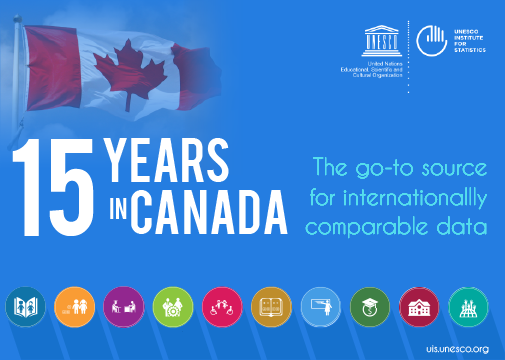By Munir A. Sheikh, former Chief Statistician of Canada
This piece was first published by the Ottawa Citizen.
December brings the 15th anniversary of one of Canada’s best-kept secrets: UNESCO Institute for Statistics (UIS). When it first opened its doors in Montreal, a handful of staff shared just a few computers. Today, the Institute is the official and trusted source of internationally comparable data on education, science, culture and communication.
Good information forms the bedrock for appropriate and effective policies. Over the past 15 years, the international development community has come to rely on the good information provided by the UIS to set the standards and targets for data, monitor progress and build the alliances and skills that are vital for the generation and analysis of good data.
As a result of UIS data, the UN system has been able to monitor progress on education over the past 15 years and chart progress towards the Millennium Development Goals (MDGs) to be achieved by 2015: universal primary education (not achieved) and gender parity in education (achieved across the developing world, with the exception of South Asia). Last September, world leaders adopted new goals to be achieved by 2030: the Sustainable Development Goals (SDGs). The UIS is now gathering and crunching the numbers on education, science, culture and communication to track global progress.
Data to make a positive impact in people’s lives
The SDGs focus less on the numbers and percentages of people reached by policies and programs and more on the impact on their lives. Take education enrolment, for example. While the overall numbers look impressive, a closer look finds 263 million children and youth out of school worldwide. Look even closer and girls are almost twice as likely as boys to never set foot in a classroom. Such human rights issues can be buried in the big numbers and would be invisible without the kind of data produced by the UIS. This is the kind of data used by Canadian organizations, such as the 60 Million Girls Foundation, to get more support for girls’ education programs.
Because it hosts the UIS, Canada is home to the world’s most comprehensive internationally-comparable education database on, for example, girls’ enrolment and completion and projections of global teacher shortages. The UIS has the only global database of internationally comparable indicators on how much countries are investing in research and development. It was the first to have a database on cultural employment, which helps countries measure and strengthen the contribution of their own culture to sustainable development.
There is also direct support from UIS to 200 countries around the world. Many have received support and training to improve the quality and use of data, while national statisticians and line ministries have been trained on international standards to help them produce and use better data.
Canada’s leadership within the UN
The UIS is also an example of Canada’s role as a leader within the UN, with a commitment to the use of data to achieve change for people worldwide. There are, however, challenges ahead. The SDGs require new and more diverse data than anything that has gone before. On education, for example, it means measuring what children are learning and whether every child has the chance to learn, as well as counting how many children are in school.
It is going to take further considerable effort to gather, analyse and make good use of all the statistics that are needed. My hope is that the Federal Government will use this anniversary as an opportunity to act as a champion for such an effort. On the global stage, for example, Canada has a high and positive international profile: people are listening to us. This could be the moment for Canada to argue for more and better data at the United Nations, and at any other international forum charting a course for human development.
We need a global champion for data
Looking at specifics, Canada could champion the new data required to track progress towards the SDGs, particularly data on girls’ education, global citizenship and education for sustainable development – areas that Canada already promotes within in its own education system and supports through its overseas aid programme. Canada is well-placed to help define global indicators on these issues and their application to all countries. A public consultation here in Canada – perhaps a joint initiative led by Statistics Canada and Global Affairs Canada – could spark debate on what it really means to be a global citizen, and how education can help to build societies that are sustainable, peaceful and secure. This would reaffirm our Canada’s position at the heart of the push for sustainable global development.



Pingback: OTR Links 12/16/2016 | doug --- off the record